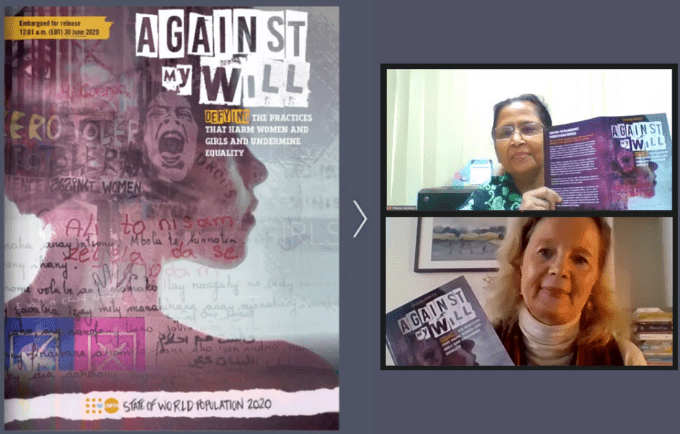UNFPA Population Report highlights the need for urgent accelerated action to stop child marriage and son preference
30 June 2020, Bangladesh – Every year, millions of girls are subjected to practices that harm them physically and emotionally, with the full knowledge and consent of their families, friends and communities, according to the State of World Population Report 2020, released today by United Nations Population Fund, the UN’s sexual and reproductive health agency.
At least 19 harmful practices are considered human rights violations, according to the UNFPA report, which focuses on the two of the most prevalent ones in Bangladesh: child marriage and bias against daughters in favour of sons.
Bangladesh has one of the highest prevalence of child marriage in the region. While much efforts have been made over the years to end child marriage, continued investments and action is urgently required, especailly in the context of COVID-19. In times of hardship and crisis, it is estimated that harmful practices such as child marriage may increase.
Gender-biased sex selection is a harmful practice that also stems from similar gender norms and attitudes that drive child marriage, as it results from the misbelief that girls are a burden to their families that do not have the same capability to contribute as males. While evidence of this harmful practice is limited in Bangladesh, a study conducted by the Population Sciences Department of the University of Dhaka revealed that strong preconditions for gender-biased sex selection exist in the country.
“We must foster respect for women and girls by changing entrenched cultural attitudes and practices. This means disrupting root causes of inequality and respecting girls’ autonomy”, said Dr Asa Torkelsson, UNFPA Representative in Bangladesh during the virtual press conference to launch the report.
The Chief Guest, Secretary of the Ministry of Women and Child Affairs, Ms. Kazi Rowshan Akhter, highlighted the progress that has been made over the years, particularly the launch of the National Action Plan to End Child Marriage in August 2018. Addressing the media, she stressed on the importance for all relevant ministries and departments to make strong commitments to end harmful practices in Bangladesh, particularly with the increasing challenges of COVID-19.
The press conference was headlined by remarks from Dr. Abul Hossain, Project Director, Ministry of Women and Children Affairs; Prof. Dr. Mohammad Bellal Hossain, Professor of Population Sciences, University of Dhaka; and Ms. Avita Islam, Founding Member of the youth-led community organization ‘Ekhoni’.
While progress has been made in ending some harmful practices worldwide, the COVID-19 pandemic threatens to reverse gains. In her concluding remarks, Dr. Torkelsson reaffirmed UNFPA’s commitment to the Government in supporting advocacy efforts to eliminate harmful practices in Bangladesh, despite the pandemic, “Now is the time for all of us to push harder. The pace of our progress must be faster despite the roadblocks that have been placed on our way. That is the pledge we owe to the millions of girls and women in Bangladesh that continue to suffer from these practices, and we will continue to work closely with the Government in realizing this commitment.”


